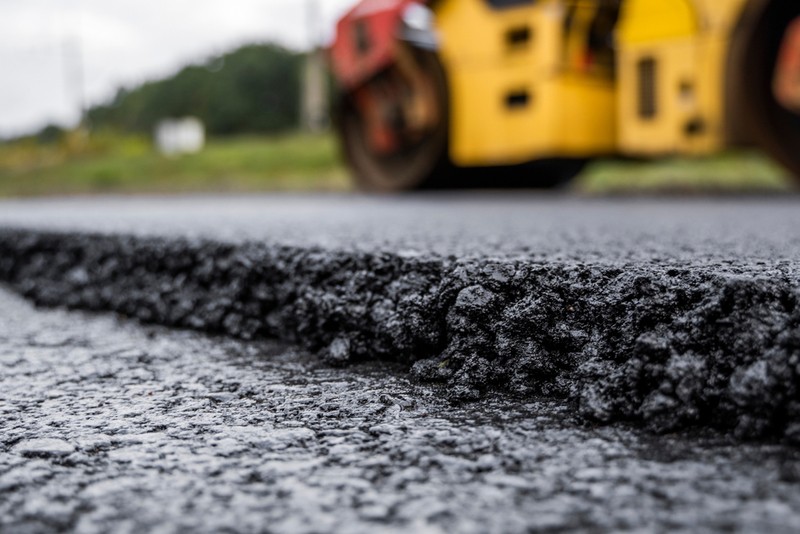Release the Prospective: Regrading and Asphalt Sealing for Industrial Spaces
Release the Prospective: Regrading and Asphalt Sealing for Industrial Spaces
Blog Article
Hot Mix Asphalt: A Sustainable Remedy for Sidewalk
Warm Mix Asphalt (HMA) has emerged as a leading lasting choice for pavement services, providing a myriad of ingenious modern technologies and ecological advantages. Its ability to recycle products and decrease power consumption presents a compelling instance for its adoption in roadway building and construction jobs. Moreover, the lasting performance and toughness of HMA make it a favored alternative for infrastructure development. As the need for environment-friendly construction methods grows, discovering the subtleties of HMA's sustainability can offer valuable understandings into the future of pavement remedies.
Ecological Benefits of Warm Mix Asphalt

Additionally, Warm Mix Asphalt aids to mitigate urban warmth island effects. Its dark shade takes in sunshine, lowering the quantity of warm showed back right into the environment contrasted to lighter-colored sidewalks. This can decrease ambient temperature levels in metropolitan areas, reducing the demand for air conditioning and eventually minimizing power usage.
In enhancement, Hot Mix Asphalt adds to boosted stormwater monitoring. Its porous nature enables water to reenergize and penetrate the sidewalk groundwater materials, decreasing drainage and the danger of flooding. These environmental benefits make Warm Mix Asphalt a lasting choice for leading freeways and roads.
Energy Efficiency in HMA Production
Is power effectiveness an important factor in the production of Hot Mix Asphalt (HMA)? Absolutely. Power plays a substantial role in the manufacturing of HMA, influencing both cost and ecological sustainability. One crucial aspect of energy efficiency in HMA manufacturing is using cozy mix asphalt (WMA) innovations (commercial parking lot paving). WMA permits the blending and placement of asphalt at lower temperatures contrasted to traditional hot mix asphalt, resulting in minimized energy consumption during manufacturing. This procedure not just reduces fuel use however additionally reduces greenhouse gas discharges, making it a much more eco-friendly choice.
Additionally, innovations in plant innovations have actually resulted in more energy-efficient HMA manufacturing processes. Modern plants are designed with attributes like recycled asphalt sidewalk (RAP) handling capabilities, reliable heater systems, and boosted insulation, all adding to energy cost savings. By optimizing energy usage in HMA manufacturing, the industry can minimize its carbon footprint while preserving high-grade sidewalk products. Energy effectiveness is, consequently, an important factor to consider in ensuring the sustainability of Hot Mix Asphalt production.
Recyclability of Warm Mix Asphalt
The recyclability of Warm Mix Asphalt (HMA) is a critical aspect of Find Out More its sustainability and long-term ecological influence. HMA is just one of the most recycled materials in the USA, with over 100 million loads of reclaimed asphalt sidewalk (RAP) being reused each year in brand-new pavement construction. Reusing HMA supplies several environmental benefits, such as lowering the requirement for virgin products, reducing energy intake throughout manufacturing, and reducing the quantity of waste sent to land fills.
The process of recycling HMA includes crushing the existing sidewalk, crushing it right into smaller sized items, and mixing it with brand-new aggregate and asphalt binder to produce a recycled mix. On the whole, the recyclability of HMA plays a significant duty in promoting lasting practices within the sidewalk market.

Long-Term Performance of HMA
Asphalt pavements demonstrate durability and durability over a prolonged duration, showing the long-term efficiency of Hot Mix Asphalt (HMA) Furthermore, advancements in HMA innovation, such as the usage of polymer-modified binders and warm mix asphalt, have actually further enhanced the sturdiness and long life of HMA pavements. By prioritizing top quality construction and upkeep practices, HMA proceeds to verify itself as a cost-efficient and lasting service for durable pavement infrastructure.

HMA: Durability and Sustainability
Showing both toughness and sustainability, Warm Mix Asphalt (HMA) has actually ended up being a cornerstone in the construction of durable sidewalk facilities - commercial parking lot paving. HMA's sturdiness comes from its capacity to withstand heavy tons, severe climate condition, and high traffic volumes, making it a dependable choice for highways, highways, and airport paths. The composition of HMA, which normally consists of accumulations, binder, and filler, plays a vital function in improving its long life and resistance to tear and use
In addition, HMA's sustainability exists look at this site in its recyclability and energy-efficient production process. The capacity to recycle redeemed asphalt pavement (RAP) in brand-new HMA mixes decreases check this the demand for virgin materials and lessens the ecological effect of sidewalk building and upkeep. Additionally, the energy efficiency of producing HMA lies in its lower mixing temperature levels contrasted to various other pavement products, leading to decreased power usage and greenhouse gas discharges.
Verdict
In conclusion, warm mix asphalt (HMA) supplies a sustainable remedy for sidewalk with its ecologically friendly characteristics. HMA's recyclability, power performance in production, and long-lasting durability make it a green option for roadway construction.
HMA is one of the most recycled products in the United States, with over 100 million tons of redeemed asphalt pavement (RAP) being reused every year in brand-new sidewalk building.The process of recycling HMA includes grating the existing sidewalk, crushing it into smaller sized pieces, and blending it with new accumulation and asphalt binder to produce a recycled mix.Asphalt sidewalks demonstrate resilience and resilience over an extensive period, mirroring the long-term performance of Warm Mix Asphalt (HMA) Additionally, improvements in HMA technology, such as the usage of polymer-modified binders and warm mix asphalt, have actually better enhanced the longevity and durability of HMA pavements. The ability to recycle recovered asphalt sidewalk (RAP) in new HMA mixes reduces the need for virgin materials and decreases the ecological influence of pavement building and construction and maintenance.
Report this page